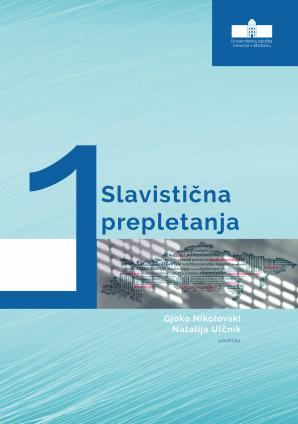Slavistična prepletanja 1
Keywords:
research of slavic languages, norm studies in slavic languages, slavic dialectologies, phraseologySynopsis
Slavic Intertwining 1.The scientific monograph Slavic Intertwining 1 includes seventeen articles related to Slovene, other Slavic languages and inter-Slavic contacts. In the first part, the linguistic-systemic is highlighted, especially the morphological-syntactic emphasis of modern Slavic studies. The second set brings linguistic and normative issues, and focuses on orthography and spelling in Slavic languages. The third part is dedicated to phraseological research, with special emphasis on the inter-Slavic aspect, and the results also touch on the field of Interculturalism. The intertwining of different research fields, methodological starting points and approaches is based on a basic reflection on current Slavic issues, their research potentials and the challenges of Slavic studies in the 21st century.
Downloads

Downloads
- K (pseudo)koordinaci v konstrukcích typu "sáhnout a vytáhnout", "čichat a cítit" K (pseudo)koordinaci v konstrukcích typu "sáhnout a vytáhnout", "čichat a cítit"
- Raziskovalni potenciali slovanskih in medslovanskih frazeoloških raziskav na primeru nekonvencionalnih replik Raziskovalni potenciali slovanskih in medslovanskih frazeoloških raziskav na primeru nekonvencionalnih replik
- Od anjc ko Babogredac. O frazeologiji u govoru Babine Grede Od anjc ko Babogredac. O frazeologiji u govoru Babine Grede
- Vezljivost kot pomensko-skladenjska organizacijska zmožnost neglagolskih besed Vezljivost kot pomensko-skladenjska organizacijska zmožnost neglagolskih besed
- Netožilniški glagoli, tematski vokali in slovenščina Netožilniški glagoli, tematski vokali in slovenščina
- Identifikacija i atribucija na (supra)sintaktičkoj razini u hrvatskome jeziku Identifikacija i atribucija na (supra)sintaktičkoj razini u hrvatskome jeziku
- Primerjalni frazemi z zoonimnimi sestavinami v slovenščini in ruščini Primerjalni frazemi z zoonimnimi sestavinami v slovenščini in ruščini
- Гневот низ призмата на зоонимната фразеологија во македонскиот и во рускиот јазик Гневот низ призмата на зоонимната фразеологија во македонскиот и во рускиот јазик
- Stereotipi o živalih v jezikovni podobi sveta srbskega in slovenskega jezika Stereotipi o živalih v jezikovni podobi sveta srbskega in slovenskega jezika
- Semantička obilježja frazema s komponentom glava/голова u hrvatskom i ukrajinskom jeziku Semantička obilježja frazema s komponentom glava/голова u hrvatskom i ukrajinskom jeziku
- Pravopisne zagate študentov programa Medijske komunikacije (študija primera) Pravopisne zagate študentov programa Medijske komunikacije (študija primera)
- Projekti Odjela za hrvatski standardni jezik Instituta za hrvatski jezik i jezikoslovlje i jezično normiranje Projekti Odjela za hrvatski standardni jezik Instituta za hrvatski jezik i jezikoslovlje i jezično normiranje
- O izzivih slovenske frazeologije pri pripravi tretje izdaje Slovarja slovenskega knjižnega jezika (eSSKJ) O izzivih slovenske frazeologije pri pripravi tretje izdaje Slovarja slovenskega knjižnega jezika (eSSKJ)
- K návaznosti textových jednotek v mluveném narativu K návaznosti textových jednotek v mluveném narativu
- Policentrični razvoj slovenskega jezika in njegov vpliv na oblikovanje govorne norme Policentrični razvoj slovenskega jezika in njegov vpliv na oblikovanje govorne norme
- Naglasne značilnosti samostalnikov s končajem -ar v sodobni knjižni slovenščini Naglasne značilnosti samostalnikov s končajem -ar v sodobni knjižni slovenščini
- Vloga zvočnosti v začetnih sT-nizih Vloga zvočnosti v začetnih sT-nizih






